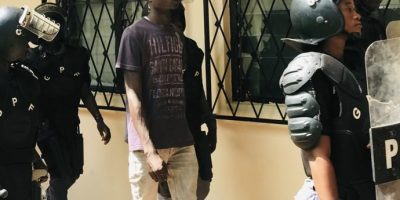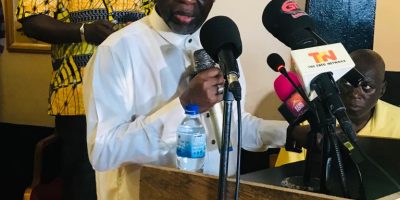 By Dr. Assan Jallow.
By Dr. Assan Jallow.
“In times of crisis, we must focus our creative energies through the power of ideation with collective resolves to address the problems of society and not on the flurry of missed opportunities.”
Humanity is currently engulfed in the pendulum of a global health and economic crisis caused by the novel coronavirus pandemic. COVID-19 seems to be taking longer than expected, while the fatality rate is still being assessed across national economies and boundaries. According to the WHO (2020), the virus has accounted for more than 736,000 deaths, from the world as of August 10, 2020 and still counting. That is way too many deaths occurring over a period of four months. That is worrying and concerning which begs the question of whether we have done enough or failed to contain the virus? What this implies is that this number is on the rise daily as we have seen the continuous surge of the virus exponentially across national demographics. It has disrupted the global supply chain and reduced social interaction; thus, making people to adapt to the new norms or risked increasing the transmission and transfers of the virus beyond its current cycle and waves. On the domestic front, the government of The Gambia has announced a D500 million as a food relief package, following the invocation of the ‘State of Emergency’ by President Barrow as provided by the 1997 Constitution of the Republic and as a necessary evil to address the public health crisis the nation is being exposed to or battling with.
The Gambia economy continues to take a further demand slump on the trajectory of economic growth and development; thus, triggering a rise on food poverty increase, increasing unemployment number, closures on schools and on non-essential businesses causing psycho-traumatic experiences for children and parents in the homes, and cash limitation for business in the brink of unsustainable recovery for lack of sales and being non-operational during these troubled times across the globe. There is no doubt that the effects of the pandemic in the global economy will have a significantly negative effect on The Gambia’s economy as we have seen the slow-down on economic activities and the continual reduction in remittances since the outbreak of the pandemic in March 2020.
Today, The Gambia has best tested and positioned at a crossroad following the outbreak of the novel coronavirus, and only responsible leadership with a whirlwind of actions crafted with the best alternative policies are the way forward to addressing the gloomy state of our nation’s public health and the economic crisis. It is obvious that the government is cash-strapped, and that our nation had been caught unaware or slapped unconsciously with the touches of bitterness by our actions or inactions following the resurgence and rise in the number of coronavirus cases of recent amid an increased in the number of registered deaths. It is concerning and worrying to see coronavirus wreaking havoc on lives and livelihoods, and no one can ascertain how the virus has penetrated our homes and public spaces as we are a closely knitted society or community at the mercy of the cling and abyss of damnation wailing on the mortars and platitudes of #YallahBaahna. True, we are said to believers and a nation of God. However, this is a virus that has proven stubborn and has been dubbed as the “global public health apocalypse” if we fail to take individual and collective responsibilities. The only way to contain this virulent calamity is to adhere to the guidelines issued out by the #WHO, CDC and our national Ministry of Health. Science is real and health is wealth. Therefore, let us not hold onto fiction and the glamorous laughter of using the theatrics of politics to debunk science and religion to be save us when we know that our thoughts do not match our actions. Almighty God should not use as a last resort as He has created us with the reasoning abilities to search and seek for knowledge to make novel discoveries that will advance the course of humanity. And, this is what science and technology is proven to us.
The imposition of a night curfew by the government is a welcome idea. However, curfew is an anathema for many of the citizens who expressed exasperation about it. Some see it as a bad faith and an infringement on their fundamental human rights and freedom of movement. It is obvious that embracing change does not come naturally to most of us and experiencing history in the making is rarely appreciated or realized as it happens. However, in times like these it is the necessary prescription and let us make the best of the situation to help contain the spiraling nocturnal of the pandemic in The Gambia causing so many deaths of recent as the virus remains a mystery. By and large, would the imposed night curfews help to flatten the curve? I doubt it as evidence shows that the primary way novel coronavirus infects people is by transmission of droplets through close person-to-person contact generated by cough and sneezes. Therefore, the transmission of the virus occurs during the day in government offices, public transportation (vehicles and buses) and public places such as markets and streets where people interact directly with each other as the laws are relaxed and life is normal. Concerning to note is that people have the liberty and luxury of coughing and sneezing at your face without covering their mouths with a tissue or having their upper sleeves or elbows on it. And, if you dare to tell them, out of courtesy on the effects it has on public health then “Musubaah Narulah Toopaalah” with a bag load of parental abuse or insults of all kinds if you are lucky. That tells you a picture of how an average Gambian reacts to many of the germane public health issues which is a mirror image of the country itself.
Interestingly, one striking cord in our DNA is the feeling of entitlement and abuse of authority or powers especially those in the corridors of power. And, for the curfew to be carried out effectively, let the spirit and the letter of the regulations be enforced with absence to any undue political influence or preferential treatments that would result to the relaxing of the laws or regulations on curfew.
The road to recovery is uncertain as nations are grappling with the pandemic to find a vaccine. No one can determine or ascertain how long the virus will stay with us and the impact it will definitely have on national economies, lives and livelihoods of the people. This is because there is no approved treatment for the coronavirus disease, and whether the vaccine will be safe and efficacious, remains unanswered.
What had gone wrong?
- Failure to take responsibility and not accepting the fundamental flaws in the health sector due to inadequate funding and poor prioritization.
- Lack of COVID-19 testing equipment.
- The forces of misinformation and indecision
- The absence of a nationally driven and well-coordinated health care reforms system to spearhead the health programs and policies of the government.
- Porous borders with Senegal and the inability of our security personnel to comb and stop nationals of both countries from crossing across the delineated national border during the lockdown has led to rebound of the virus and the increase in the numbers of confirmed cases.
- Lack of proper planning and ineffective coordination of the National Coronavirus Taskforce. This had resulted to lack of leadership, the absence of a definite direction and vision, coupled with the diminishing returns on morale and lack of motivation or ineffective participation of its constituted members and frontline workers’. Strategic leadership direction and visioning is effective when set goals are clearly mapped out, understood and pursued through effective communication based on character, result-driven behavior and fidelity to achieve the public goods absence of the vices of political correctness, sabotage and undermining clichés.
- The government’s shock and awe approach to the shutdown and failing to make adequate capital available for business through government-backed credit guarantee programs has caused tremendous disruption to businesses. This has exposed businesses to the gloomy path of disastrous risks and unquantifiable economic loss; thus, leaving and making them stranded in the dark tunnels of no income-safety nets to help them cushion out their loss during the pandemic.
- Delays in the deployment of the food aid relief as the provided relief funding was inadequate poorly disbursed or never reached their intended beneficiaries in time.
- The lack of a coherent policy on school reopening and measures to take to ensure that our schools are safe for both the teachers and the students (pupils) for interactive instructional learning to take place.
- The sham procurement process on the government’s rice relief program
- Use of funds on non-essential items like purchasing cars and allowances rather than on the procurement of basic medical supplies and PPE for use.
- Failure of the government of not being able to provide every household with a reusable mask to inject a good faith of an exerted political leadership to inspire a health conscious reasonings to the citizens on the pandemic.
- Poor health infrastructures, lack of medical supplies and absence of good monitoring mechanism and absence of readiness for clinical care and treatments.
- The absence or ineffective participation of the country’s opposition parties who resorted to taking bait of quietude and the silence mode, despite the country battling with a crisis of this magnitude wreaking havoc on the economy and lives.
Ways to Stem the Coronavirus
The pandemic has exposed the Gambian economy and its citizens to the tortures of hell on earth as a result of pursuing meaningless economic development programs with self-serving desires and failing to build an economy for all and a health system that is fit for purpose. Having said that our economy is built on the triangle of increasing poverty, the tribes and misappropriation of funds or resources through investing in elephant projects for easy political endorsements rather than on social programs and industrialization that will create wealth, build an economy, create jobs and lift people out of the chronic cycle of induced-poverty.
- The government should take responsibility and the President of the Republic should and must address the Nation regarding the state of affairs (i.e., the pandemic and the economy) what plans and actions his government is taking to contain the virus and restore normalcy in the economy.
- The government should account for the all funds invested in the fight against COVID-19 and report it to the National Assembly. It is important and that is what a responsible government should do to array the fears of citizens regarding their concerns on misappropriated funds.
- The government should roll-out the program on state entrepreneurship and invest in the productive base of the economy to create wealth and jobs for the citizens.
- The government should ensure people’s livelihoods are protected and that they have spending power through a significant direct cash assistance.
- It should make adequate capital available for businesses through government-backed credit guarantee programmes
- It is imperative to embrace a new model of financial and democratic governance in which planning, and execution is converged into tangible actions. Planning and actions are the base elements of progress. It should fix the financial sector through institutional autonomy and processes.
- Focusing more on continual strategic initiatives through collaborative engagements and continuous communications with all the relevant stakeholders, particularly the private sector. It is a proven fact that collaborative efforts through effective communications where the citizens are involved or engaged helps in driving better planning and the desired change as it has the enormous benefits of winning hearts and minds of the people.
- The government should make adequate capital available for business through government-backed credit guarantee programs to assist businesses impacted by COVID-19.
- Develop and coordinate a coherent educational policy on school reopening and what measures to take to avoid any possible transmission or infection of the virus to by the children in the schools.
- Prioritize funding and redirect all resources to the education, health, agriculture, and energy sectors as they are the engines of growth and any form of underfunding will result to the collapse of the Gambian economy in entirety.
All of this cannot be pursued in the absence of lack of resources or funds, knowing fully that The Gambia is a resource-constraint economy. Borrowing will most definitely increase The Gambia’s debt to GDP ratio. Though, I am not a keen supporter of borrowing as most often than not the borrowed funds by national government are not invested in the right areas that need urgent interventions, especially in developing and emerging economies. But, if is the only available means and option to cushion the economy, spur growth and fund the health, education, and agriculture sectors, and by extension to save lives, then it is worth it and I am fully in support of it with my strongest endorsement based on the principles of fiscal discipline. However, caution must be taken, and the government should only borrow on need-basis and not on the platform of being overambitious and pursuing multitude of programs that will add no value to the lives and livelihoods of the citizens. Meaning, borrow and spend the funds judiciously and wisely as the Gambian economy is contracted and cash-strapped amid the global health crisis caused by the coronavirus pandemic. Therefore, I would recommend the government to borrow if is it the alternative mechanism to save our troubled economy and encourage people to stop talking but be more pragmatic, and responsive as players and not oppositions who condemned for political capital as no talking or prayers will save us from our current national dilemma.
The cumulative underlying damage or impact of the pandemic is fatal. And, we cannot bring back the dead, neither can we financially pay reparations to all the businesses that lost sales following the outbreak of the pandemic, nor can we remain indifferent and insensitive to their plights and pains or continue to be silence and ineffective in resolving issues or failing to taking actions to resuscitate our dying economy and failed health sector. These are disruptive times in human history and not time to play croquet with flamingos because failure to respond timeously to matters of these kind produces the monolithic baseline that threatens, poisons and suffocates creativity and innovation, thus throwing away ideas in the swamps of missed opportunities. Therefore, the visibility, or the presence of the national government is critical and can serve as a caveat of reassurance and a nursing opportunity to heal a traumatized nation and especially for those who had lost their loved ones to the pandemic. This will indicate that leadership at its best and the duty to care is been demonstrated by the government with the reassuring spirits and aspirations that they are doing their utmost best to contain the virus and address the seemingly intractable challenges it has on the economy, business, and the people.
To make a difference amid the plethora of challenges and opportunities we are dreaded in, we must not become a nation of Yuppies bent on acquiring status symbols and only interested in building a political capital by remaining silence in times like these. We must chart a course of cautious actions by being inquisitive and curious about everything revolving around COVID-19 based on science with the prepared minds and the willing hearts to weather the storm against it with the power of resilience and drive and not on vicissitudes of propaganda or conspiracy theories and waiting for a deliverance from the gods of ignorance, indecisions and inactions
Mapigano yanaendelea ………….




Ma sha Allah great and thanks for sharing